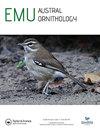夜鹦鹉(鹦鹉科:西方鹦鹉)的颅骨适应性,一种隐秘的夜行鸟
IF 1.1
4区 生物学
Q3 ORNITHOLOGY
引用次数: 0
摘要
夜鹦鹉(Pezoporus occidentalis)是一种极度濒危的、难以捉摸的夜行鸟类,很难在野外进行研究。关于它的生物学还有很多未知之处,包括它如何在夜间导航。先前对眼睛和大脑的调查显示,它的夜间视力可能很差,但它的其他感觉能力和整体头骨解剖结构尚未得到调查。这项骨学研究,基于微型ct扫描的全型,描述和比较夜鹦鹉头骨的解剖结构,并确定其可能的生态适应。专门的耳朵解剖表明,夜鹦鹉具有更强的听觉能力,与它白天的同类P. wallicus和唯一的其他夜间活动的鹦鹉Kakapo Strigops habroptila相比。夜鹦鹉独特的放大的枕骨可以放大声音,而在其他鹦鹉物种中没有发现的双耳不对称,可能增强了它的定向听力,就像许多种类的猫头鹰一样。扩大的外枕取代了颧骨突起,限制了眼眶的大小,这表明听觉和视觉之间的进化权衡。该物种的听觉能力需要更深入的研究,但我们的解剖学观察表明,噪音干扰的潜在影响可能值得在夜鹦鹉保护策略中考虑作为预防措施。本文章由计算机程序翻译,如有差异,请以英文原文为准。
Cranial adaptations of the Night Parrot (Psittaculidae: Pezoporus occidentalis), a cryptic nocturnal bird
ABSTRACT The Night Parrot Pezoporus occidentalis is a critically endangered, elusive, nocturnal bird that is difficult to study in the field. Much is unknown about its biology, including how it navigates at night. A previous investigation of the eye and brain revealed that it likely has poor nocturnal vision, but its other sensory abilities, and overall skull anatomy, have not yet been investigated. This osteological study, based on micro-CT-scans of the holotype, describes and compares the anatomy of the Night Parrot skull, and identifies its possible ecological adaptations. Specialised ear anatomy suggests that the Night Parrot has enhanced acoustic abilities, in contrast with its diurnal congener P. wallicus and the only other nocturnal parrot, the Kakapo Strigops habroptila. The Night Parrot’s uniquely enlarged exoccipital bones may amplify sound, and bilateral ear asymmetry, not identified in any other parrot species, likely enhances its directional hearing, as in many species of owl. Enlarged exoccipitals displace the zygomatic processes and constrain orbit size, suggesting an evolutionary trade-off between hearing and vision. The auditory abilities of the species require deeper investigation, but our anatomical observations indicate that the potential impacts of noise disturbance may warrant consideration in Night Parrot conservation strategies as a precaution.
求助全文
通过发布文献求助,成功后即可免费获取论文全文。
去求助
来源期刊

Emu-Austral Ornithology
生物-鸟类学
CiteScore
2.00
自引率
7.70%
发文量
33
审稿时长
>12 weeks
期刊介绍:
Emu – Austral Ornithology is the premier journal for ornithological research and reviews related to the Southern Hemisphere and adjacent tropics. The journal has a long and proud tradition of publishing articles on many aspects of the biology of birds, particularly their conservation and management.
 求助内容:
求助内容: 应助结果提醒方式:
应助结果提醒方式:


